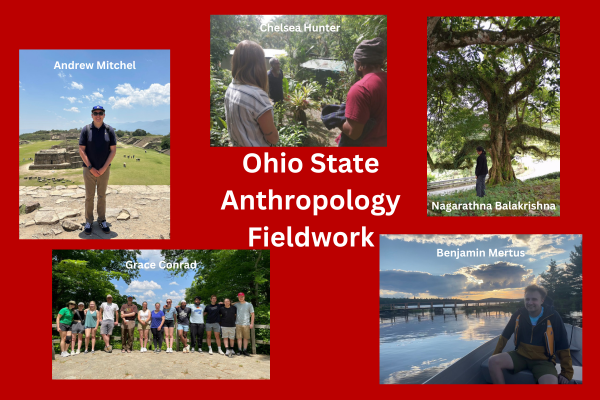Summer Fieldwork 2023 OSU Anthropology

Reading more about the ongoing work in the field by our graduate students!
You can view their biographies below or on our Instagram page.
Andrew Mitchel
Andrew spent a month working on two related projects in Mexico. One is with women working in markets selling chapulin, or toasted grasshoppers, and the major research question is unearthing if this is their primary economic activity. Andrew also began interviews for his dissertation working with chefs in Oaxaca on how they adapt their food to the expectations of culinary tourists.
Grace Conrad
This summer Grace served as a field school supervisor at the Turpin site in Anderson Township, Ohio. While teaching undergraduate students archaeological fieldwork methods, she became more familiar with the site, which will serve as part of her dissertation research. She not only learned about the archaeological material at the site, but also about the people who once lived there, their descendants, and the colonial legacy of archaeological work in the area.
Chelsea Hunter
Last fall Chelsea completed several months of ethnographic fieldwork in New Caledonia, a southwestern Pacific Archipelago with an ongoing decolonization movement. While there, she interviewed representatives from small- and large-scale organizations and associations dedicated to working on environmental conservation issues. Her research examines the relationship between collaborative environmental management and conservation and Indigenous sovereignty.
Nagarathna Balakrishna
Nagarathna spent a month in the uniquely fragmented forests of the Valparai plateau situated within the Anamalai Tiger Reserve of the Western Ghats region in India, observing primates inhabiting the forest fringes. During her time there, she followed groups of lion-tailed macaques, Nilgiri langurs, and Bonnet macaques. She also had the opportunity to engage in casual conversations with the local people, who coexist with a plethora of wildlife species in this ever-changing landscape, frequently interacting with them. Nagarathna's research will focus on the human-primate interface, studying the impacts of anthropogenic disturbances on the health and well-being of primates, and the attitudes and perceptions that people hold towards these primates to inform conservation action.
Benjamin Mertus
Ben's research explores the intersection between ecotourism development and socio-environmental resilience in a North American Indigenous community. Through this framework, he explores the following questions: how do community members involved with ecotourism development make choices about the elements of their culture and environment they emphasize to visitors? Are ecotourism programs reflective of broader community ideals and identity, and how do these perspectives vary within the community?
